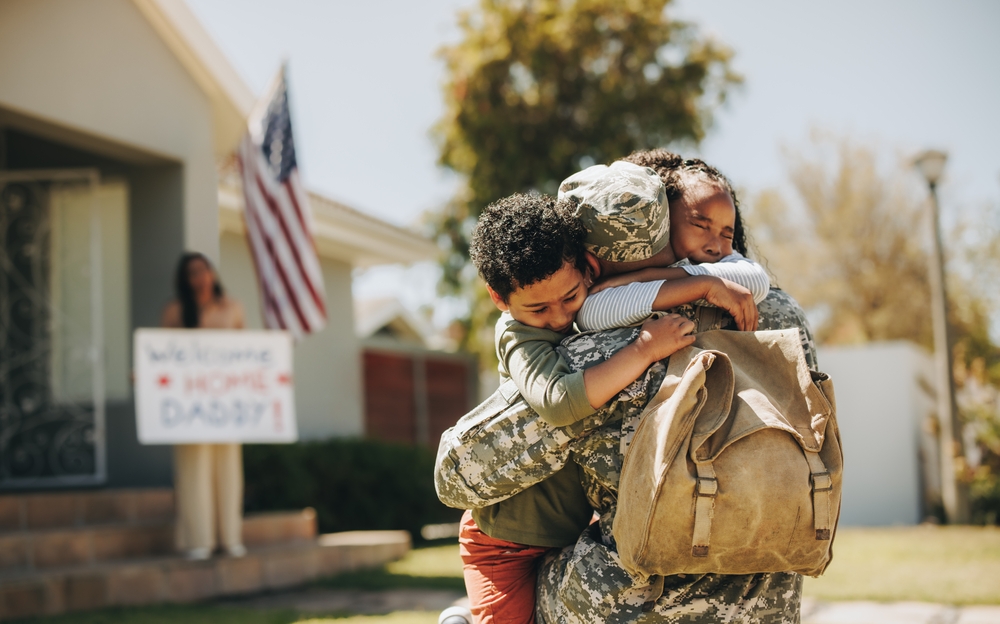Parents deployed overseas are mythical figures to their children and in some cases a parent may even be a complete unknown. Besides the separation and the storybook quality of the reunion, there are also many difficulties to overcome. Kars4Kids talked to some parents and children about their experiences of deployment and reunion to get a feel for the needs of these families and how they might be helped.
“Carly was so afraid of Joe,” said Sheryl Sanders of her 2 year-old daughter. “Here was someone hugging her and being really familiar with her, but it was someone she didn’t know. All the stranger danger warnings I’d given her kicked in and she freaked, kicking and screaming, every time Joe picked her up or hugged her. And the thing is he was dying to cuddle with her and get to know her after all that time away. It hurt.”
Marla Taylor’s daughter Amanda, 12, had a completely different experience. “I missed him so much when he was away. I thought about our reunion all the time, planned it out in my head.”
“I didn’t understand.”
But when Amanda’s father Chuck returned from Afghanistan, all he wanted was to be left alone. “I remember when I first saw him, I ran to him for a hug. He stiffened up. I could feel it. I didn’t understand.”
Chuck was suffering from post traumatic stress disorder (PTSD). But Amanda didn’t know that. She thought her father was angry at her. “I wanted to make things right, but I didn’t know how.”
Marla had known this might happen. After some discussion, she managed to get Chuck to seek help. Therapy and medication have brought Chuck a long way since that time. Amanda has learned as much as she can about PTSD and has come to understand that Chuck’s behavior is unconnected to anything she might have said or done. Still, sometimes Amanda will see a clip of a soldier’s fairytale homecoming and it pains her that she never got her own fairytale reunion—the one in her dreams.
“Mom wasn’t there to tell me what to do.”
In the case of the Garcia family, it was June Garcia who was deployed. She wasn’t there when her youngest of four got her first period. “It was awful,” said Maria, age 13. “Mom wasn’t there to tell me what to do. I asked my friends, instead.”
June reunited with her family just two months later. Maria was standoffish. “It took some time for Maria to forgive me for being away at such an important time in her life. I left her to fend for herself. She didn’t get why my country took precedence over her needs as my daughter. I could see her point.”
June worked hard at reestablishing the relationship with Maria. “I gave her extra time. Out of all the kids, she was the neediest. They all had their own needs that had to be addressed, but Maria had suffered the most because I wasn’t there when she felt she most needed me. I spent a lot of time with her, just doing things. It made a difference. Things are much better now.
It Gets Better
I tell other families, ‘It does get better. Be patient. Be there however they need you to be there.’”
A study on deployment and its effects on children by Child Trends researcher David Murphey, included the following ideas:
- When a deployed parent returns home, there may be new risks and challenges for the family, in particular if the parent who returns has serious mental or physical issues.
- The well-being of children tends to mirror the well-being of those who take care of them. If a parent is upset or depressed, for instance, the child may act out with behavior problems. Worse yet, such children are at greater risk for abuse.
- The most important strategy to adopt in supporting children in a military family is to ensure a good support system (emotional, social, and practical) for the non-deployed parent.
- Major stressors for military families include frequent moves, difficulties in obtaining adequate childcare, and lack of access to health care—in particular to mental health care.
- Families whose deployed parent serves in the Reserves or with the National Guard are often under-served compared to families that live on army bases and lack the supports available to the latter.
- The issues of children in military families don’t just pass with time but tend to continue on for years. These children will have exceptional needs that will need to be addressed, even as they grow into adulthood.
Deployment and reunion come with special challenges. These military families need all the help they can get. Do you know a military family? You may want to think about what you can do to support their needs. After all, they’re sacrificing to serve you, it’s something you can do for them.
